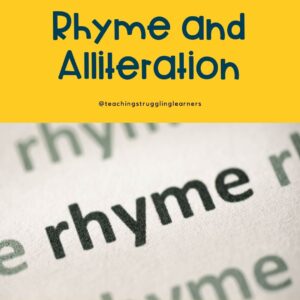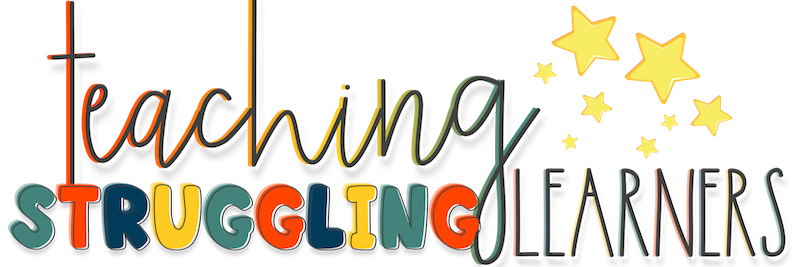Rhyme and alliteration are pieces of the phonological awareness pie.

Confession time…I hate teaching rhyme and alliteration. There, I said it. I hate it. It seemed like a useless skill, unless you are trying to produce poetry, otherwise what is the point.
I don’t like teaching it because I have a hard time hearing it to this day. I have to pull apart the words and make a mental effort to figure out if two words rhyme. It will ruin my day. I put off working on it with my older son, and am actively putting off working on it with my younger son. That is how much I hate it.
I learned about rhyming words a long time ago, have had ages of practice, but still have to put forth effort to do it. I can teach it to kids, who can then do it more easily than I can! Talk about frustrating!
That is the reality we teachers face. Sometimes we can teach a skill. We can have students practice a skill until they are able to do it independently. But that doesn’t mean that the skill we teach will be EASY for them. As much as we say practice makes perfect or better or EASY. Sometimes students brains are wired differently…like mine. It isn’t that they CAN’T or WON’T, but that it isn’t easy. And honestly none of us want to continue to practice something that doesn’t get any easier with all the practice we put forth.
For me it is rhyming. For a student you have, it could be rhyming or learning letter sounds or how to blend sounds. No matter what the skill, the students CAN learn….but that doesn’t mean it will be easy for them.
That is rhyming for me in a nutshell. A task that I avoid until I can’t anymore.
So….why DO we bother teaching it?
Turns out that rhyme really does help students become more familiar with the sounds of words. It prepares them to understand and benefit from word families. It also helps students hear all the different parts of words, and be able to segment words as they become more advanced in their phonological awareness.
Rhyme and alliteration are important skills to teach, and practice. This is especially true for students who are struggling with their reading.
Students who need more than just a quick refresher to get back on track with rhyming or alliteration may need more intensive intervention, including progress monitoring.
Just like with all progress monitoring, going into the task with the materials that you need, and a goal to reach for is really important. Yes, have the practice ready and how you plan to teach the skill. Don’t forget to write down the progress information consistently so that you can show the student, and possibly their parents, the progress they are making.

